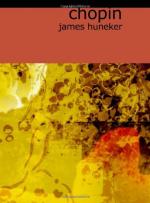Stanislaw Przybyszewski in his “Zur Psychologie des Individuums” approaches the morbid Chopin—the Chopin who threw open to the world the East, who waved his chromatic wand to Liszt, Tschaikowsky, Saint-Saens, Goldmark, Rubinstein, Richard Strauss, Dvorak and all Russia with its consonantal composers. This Polish psychologist—a fulgurant expounder of Nietzsche—finds in Chopin faith and mania, the true stigma of the mad individualist, the individual “who in the first instance is naught but an oxidation apparatus.” Nietzsche and Chopin are the most outspoken individualities of the age—he forgets Wagner—Chopin himself the finest flowering of a morbid and rare culture. His music is a series of psychoses—he has the sehnsucht of a marvellously constituted nature—and the shrill dissonance of his nerves, as seen in the physiological outbursts of the B minor Scherzo, is the agony of a tortured soul. The piece is Chopin’s Iliad; in it are the ghosts that lurk near the hidden alleys of the soul, but here come out to leer and exult.
Horla! the Horla of Guy de Maupassant, the sinister Doppelganger of mankind, which races with him to the goal of eternity, perhaps to outstrip and master him in the next evolutionary cycle, master as does man, the brute creation. This Horla, according to Przybyszewski, conquered Chopin and became vocal in his music— this Horla has mastered Nietzsche, who, quite mad, gave the world that Bible of the Ubermensch, that dancing lyric prose-poem, “Also Sprach Zarathustra.”
Nietzsche’s disciple is half right. Chopin’s moods are often morbid, his music often pathological; Beethoven too is morbid, but in his kingdom, so vast, so varied, the mood is lost or lightly felt, while in Chopin’s province, it looms a maleficent upas-tree, with flowers of evil and its leaves glistering with sensuousness. But so keen for symmetry, for all the term formal beauty implies, is Chopin, that seldom does his morbidity madden, his voluptuousness poison. His music has its morass, but also its upland where the gale blows strong and true. Perhaps all art is, as the incorrigible Nordau declares, a slight deviation from the normal, though Ribot scoffs at the existence of any standard of normality. The butcher and the candle-stick-maker have their Horla, their secret soul convulsions, which they set down to taxation, the vapors, or weather.
Chopin has surprised the musical malady of the century. He is its chief spokesman. After the vague, mad, noble dreams of Byron, Shelley and Napoleon, the awakening found those disillusioned souls, Wagner, Nietzsche and Chopin. Wagner sought in the epical rehabilitation of a vanished Valhalla a surcease from the world-pain. He consciously selected his anodyne and in “Die Meistersinger” touched a consoling earth. Chopin and Nietzsche, temperamentally finer and more sensitive than Wagner—the one musically, the other intellectually—sang themselves in music and philosophy, because they were so constituted. Their nerves rode them to their death. Neither found the serenity and repose of Wagner, for neither was as sane and both suffered mortally from hyperaesthesia, the penalty of all sick genius.




